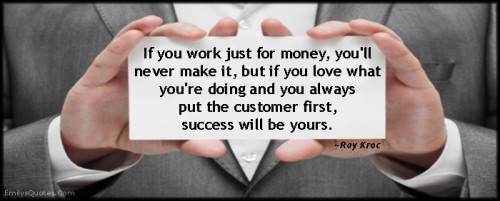What is Customer Success? Here’s the Scoop.
Customer success is a bit of a new concept, but it’s also a simple one: your client’s growth will fuel your own growth. In the same way that farmers are only as successful as their crops, businesses are only as successful as their clients.
Many businesses don’t yet have customer success teams, partly because its early enough in the history of the field that there are still unanswered questions about how to approach it within a business. But customer success is the approach.
If you’re only looking to put a customer success team in place to help yourself or turn profit, you may not understand what this is all about. Before building a team, you need to build a work culture with customer success at the center of it. It’s about being an advocate for your clients and finding ways to help them succeed. Then your success will follow.
The Evolution of Customer Success
Don’t get stuck in old business models of adversarial customer-business relationships. Within these models, your goal is to boost performance as much as possible, even if it means sacrificing relationships with clients. This leads to pushing products that aren’t right for clients to sell licenses, pressuring clients to purchase services that they aren’t ready for, or even intentionally misleading or deceiving clients to gain an upper hand.
The customer success model takes focus off your performance and places it on your client’s performance. This represents a recent turning point in the history of business that has been credited to a number of things – the dawn of the digital age, the effects of internet-sourced information overload, growing socio-economic disparities in consumer demographics, and changes in domestic and global marketplaces, to name a few. This turning point has shifted consumer power dynamics. Businesses no longer have the power. Customers do.
What does this mean for your business? The answer varies, but ultimately it depends on your industry. Since we’re software nerds here at BrainSell, let’s take the business software industry as an example.
Before the power shift, the industry standard was to sell as many perpetual software licenses as possible. Profit came directly from a one-and-done deal where you handed over all services and product licenses to the client upfront. This made client relationships relatively short-term – and low-value. They often ended right after a closed sale.
After the power shift, subscription licenses – which require clients to consistently renew their services and product licenses with your business – became popular. Instead of ending with a hit-and-run purchase exchange, client relationships could now potentially have long-term or even lifetime value. Subscription licenses don’t turn as much initial profit as perpetual licenses, but this relationship model allows you to offer extended support. Thus, the need for more infrastructure to bridge sales to support was born.
Support Vs. Success
It wasn’t long before companies realized customer support wasn’t enough. Support is a reactive service that mitigates existing problems. It doesn’t set up clients for long-term success, it just puts them back on track for short-term success. You will need support teams to chase down solutions, but it’s important to remember that these interactions are more about your products than your client’s experiences. Interactions with customer success teams are less about your products and more about your client’s experiences.
Let’s take it one step further. By tracking usage and adoption, as well as regularly checking in and providing aid whenever possible, you make sure that problems don’t develop in the first place. Customer success is a proactive process that bridges the gaps in your business services – and encourages clients to keep renewing.
While both support providers and a customer success managers (CSMs) are ultimately an asset to your business, CSMs champion the cause of client success. They’re not sales, administration, marketing, or support staff. They’re advocates for the client and they guide them through improvement of their business – not yours. They make sure all needs are met and communicate with clients on a cadence. To do this throughout the lifetime of a business relationship is to understand that the sale no longer ends with the sale. The sale is no longer the product or service. The sale is not a sale at all.
Uncharted Territory
CSMs are caught in an interesting position. They’re Sherpas who guide clients through the course of success – but ironically, there aren’t Sherpas for CSMs to be successful in their field. “Customer success” has only been around for about 25 years since the term was popularized by Vantive’s CEO in 1997. There’s no established leader or rule-book for the field. Many companies use self-made protocols to fit their unique definitions of “customer success.”
Sometimes CSMs are introduced to a client at the time of a sale – sometimes later. Sometimes CSMs play other roles at a company – sometimes not. Sometimes CSMs carry out training, consulting, and other services – sometimes they’re just service brokers. The list goes on. To give an idea of what CSMs actually do, as opposed to these lofty definitions, let’s outline BrainSell’s customer success protocol.
At the start all projects, we introduce clients to a CSM who specializes in whichever software solutions the client has. We want clients to be wildly successful – but that means we need to invest time into them. Our CSMs take time to understand clients, their businesses, their personalities, and their goals. As a relationship is established, we regularly administer optional (although strongly encouraged) customer success reviews to our clients. Some of these review questions include:

2) Have your business objectives changed?
3) Have you had a change in administration?
4) Do you have any lingering technology or skillset issues?
5) Are you happy your product and product vendor’s policies?
6) Are there areas of your business you’d like to improve?
It doesn’t stop there. Internal leadership teams collect the reviews and hold meetings with CSMs to go over any changes and develop action plans to ensure clients are still aligned with their objectives.
Key Ingredient to Customer Success?
A solid CRM platform.
To build and manage relationships with clients, you will need CRM software to provide the right information at the right time without missing a beat. Compassion and dedication will help you cultivate a much-needed personal touch and good attitude. CRM software will help you solidify your professional processes and tools. And the best customer success approach is both personal and professional – so don’t skimp on this necessary technology.
Feeling overwhelmed? Contact us to chat about your customer success goals and how the right CRM can help you.

Stay in the Loop
Subscribe to get all our latest content sent directly to your inbox!






